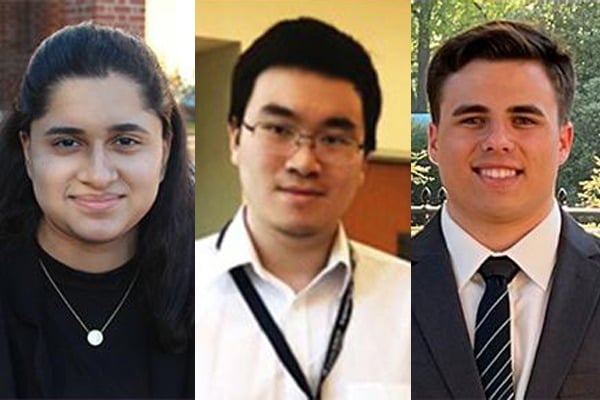Johns Hopkins Biomedical Engineering students Sheila Iyer, Erick Rocher, and Nathan Wang have received Goldwater Scholarships, which recognize students for their research and achievements in the STEM fields. The Hopkins students join a selective cohort: Only 413 Goldwater Scholars were named from a pool of more than 5,000 applicants.
The Goldwater Scholarship awards winners up to $7,500 for tuition, fees, books, and room and board. Established by Congress in 1986 to honor the legacy of soldier and statesman Barry Goldwater, it is one of the earliest significant national scholarships focusing on STEM fields. The national prestige afforded through the Goldwater Scholarship has also been known to give students a competitive edge when pursuing graduate fellowships in their fields. Many Goldwater Scholars at JHU and beyond go on to obtain Rhodes Scholarships, Churchill Scholarships, Marshall Scholarships, Hertz Fellowships, Graduate Research Fellowships from the National Science Foundation, and many other prestigious awards.
Schools nominate up to four students from a pool of sophomores and juniors, and nominees are selected for their research record and potential for leadership in STEM fields. This year, three winners represent the Department of Biomedical Engineering.
Sheila Iyer (Biomedical Engineering & Computer Science) is interested in and passionate about computational genomics research and plans to pursue an MD-PhD and a career exploring the roles of genomic variants in disease pathogenesis. Attending one of the nation’s top STEM high schools, Sheila got an early start as a researcher and began working with Ben Langmead in the Department of Computer Science before arriving at JHU on a project to improve genomic analysis by assessing reference bias in DNA sequence alignment. She received a Bloomberg Distinguished Professor Research Award for the summer of 2021 to work in Steven Salzberg‘s lab on a pipeline for identifying nuclear mitochondrial insertions, which can cause disease if inserted into important coding genes or regulatory regions. Since then, she has worked at the lab of Mary Armanios studying clonal hematopoiesis, a precursor to cancer, as an adaptive evolutionary response to telomere dynamics and examining genes involved in telomere length regulation and cancer predisposition. Outside of the lab, she is a member of a BME Undergraduate Design team, a teaching assistant for many courses, a member of the Medical Technology Network Board at JHU, and a child life volunteer in the pediatric ICU at Johns Hopkins Hospital.
Erick Rocher (Biomedical Engineering) came to JHU determined to build his research skills despite pandemic restrictions. Amid lab closures, he worked at Lockheed Martin, where he analyzed decades of flight data to determine the root cause of failure of an aerial targeting system. At JHU, he co-founded a design team that evolved into ThermOptik LLC, which focuses on improving tools and procedures for cataract surgery; Rocher serves as chief research officer. He is also currently leading a second design team, SimMetric, that is developing a virtual simulator to improve robotic surgery training. This past summer he completed a clinical research project in cardiac surgery at the Minneapolis Heart Institute Foundation. He then joined Jordan Green‘s group, where he is now working to realize the wide-ranging therapeutic potential of polymeric nanoparticle gene delivery. Apart from his research, Rocher devotes time to serving as an EMT with the Hopkins Emergency Response Organization and volunteering as a youth wrestling coach and STEM mentor, building on his two years as a varsity wrestler at JHU.
Nathan Wang (Biomedical Engineering & Applied Mathematics and Statistics) is devoted to synergizing AI and neuroscience. He joined Xingde Li‘s lab in his second year, where he developed a deep learning model for cancer detection using intraoperative optical imaging. Recently in the same lab, he is working on improving two-photon microscopy for studying animal behavior. Last summer, Wang joined NIH’s Functional Neurosurgery Lab, where he uses state-of-the-art neural network models and human brain recordings to study human visual memory. In parallel, he is developing a project in collaboration with Web Stayman‘s lab and Xun Jia‘s lab at JHU on photon-counting CT thermometry to improve the safety and outcomes of thermal ablation cancer therapies. Beyond his research, Wang advocates K-12 AI education. During his freshman year, he worked with Rep. Paul Tonko’s legislative team to draft H.R. 8390: the AI Education Act, which was passed as part of the 2021 National Defense Authorization Act.

